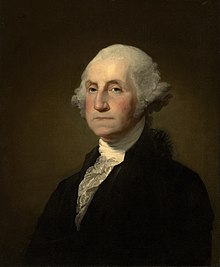| Founding Fathers of the United States | |
|---|---|
| 1760s–1820s | |
 The Committee of Five (Adams, Livingston, Sherman, Jefferson, and Franklin) present their draft of the Declaration of Independence to the Second Continental Congress in Philadelphia on June 28, 1776, as depicted in John Trumbull's 1819 portrait | |
| Location | The Thirteen Colonies |
| Including | Signers of the Declaration of Independence (1776), Articles of Confederation (1781), and United States Constitution (1789) |
| Leader(s) | |
| Key events | |
| This article is part of a series on the |
| History of the United States |
|---|
 |

The Founding Fathers of the United States, often simply referred to as the Founding Fathers or the Founders, were a group of late-18th-century American revolutionary leaders who united the Thirteen Colonies, oversaw the War of Independence from Great Britain, established the United States of America, and crafted a framework of government for the new nation.
The Founding Fathers include those who signed the United States Declaration of Independence, the Articles of Confederation, the United States Constitution and other founding documents; it can also be applied to military personnel who fought in the American Revolution. The single person most identified as "Father" of the United States is George Washington, a general in the American Revolution and the 1st President of the United States. In 1973, historian Richard B. Morris identified seven figures as key founders, based on what he called the "triple tests" of leadership, longevity, and statesmanship: John Adams, Benjamin Franklin, Alexander Hamilton, John Jay, Thomas Jefferson, James Madison, and Washington.[2]
Most of the Founding Fathers were of English ancestry, though many had family roots extending across various regions of the British Isles, including Scotland, Wales, and Ireland. Additionally, some traced their lineage back to the early Dutch settlers of New York (New Netherland) during the colonial era, while others were descendants of French Huguenots who settled in the colonies, escaping religious persecution in France.[3][4][5]
- ^ Jilson, 1994, p. 291; Portrait by Gilbert Stuart
- ^ Morris, 1973, p. 1
- ^ "English Emigration". Spartacus.schoolnet.co.uk. Archived from the original on April 8, 2014. Retrieved August 21, 2017.
- ^ Haefeli, Evan (2012). New Netherland and the Dutch Origins of American Religious Liberty. University of Pennsylvania Press. ISBN 978-0-8122-0895-5.
- ^ Lee, Hannah Farnham Sawyer (1973). The Huguenots in France and America. Vol. 1–2. Genealogical Publishing Com. ISBN 978-0-8063-0531-8.